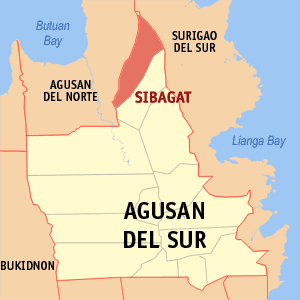
Sibagat, Agusan del Sur
Encyclopedia

Philippines
The Philippines , officially known as the Republic of the Philippines , is a country in Southeast Asia in the western Pacific Ocean. To its north across the Luzon Strait lies Taiwan. West across the South China Sea sits Vietnam...
. According to the 2000 census, it has a population of 28,685 people in 5,289 households. The town is 29 kilometers away from Butuan City
Butuan City
The City of Butuan is the regional center of Caraga, serving as an administrative region of the Philippines; it is a highly urbanized city. It is located at the northeastern part of Agusan Valley, Mindanao, sprawling across the Agusan River. It is bounded to the north, west and south by Agusan del...
. Its economy is dependent heavily on subsistence agriculture.
The word Sibagat is from the word "bagat" which means meet or meeting place. According to the oral history, the river near Sibagat which is also called Sibagat River is the place where the warring tribes meet and fight. Sibagat River is tributary of a bigger river, the Wawa river. The losing tribe would retreat downstream to the Wawa River and disappear.
Most of the people living in the town are Visayan-Cebuano migrants.
Barangays
Sibagat is politically subdivided into 24 barangayBarangay
A barangay is the smallest administrative division in the Philippines and is the native Filipino term for a village, district or ward...
s.
|
|

